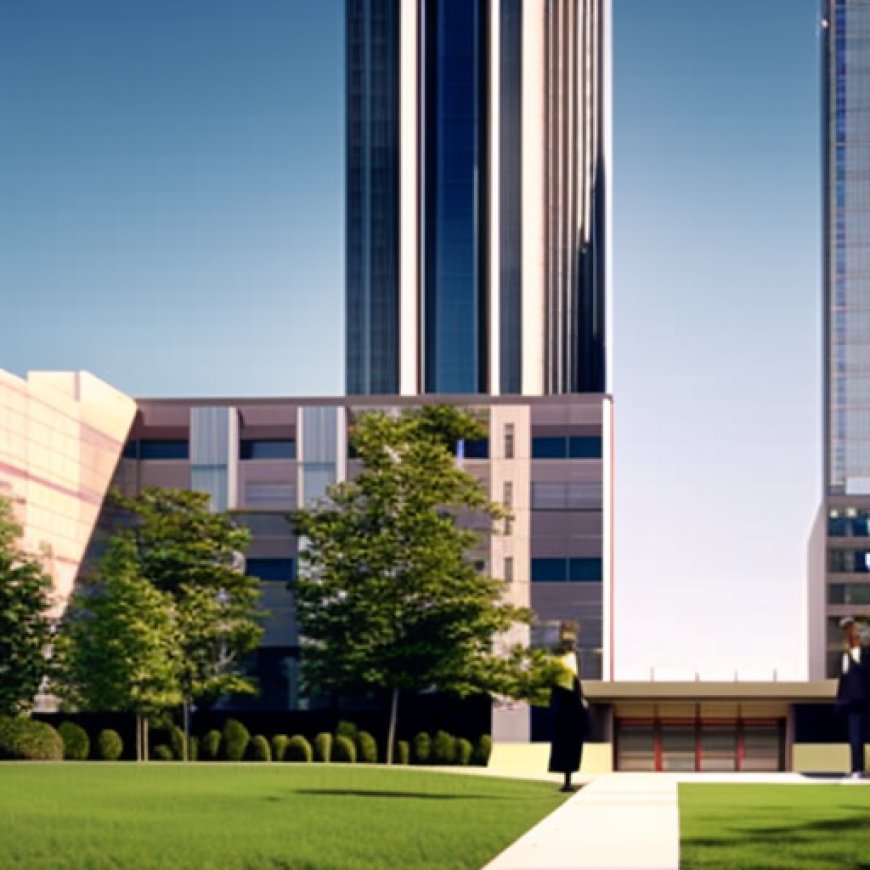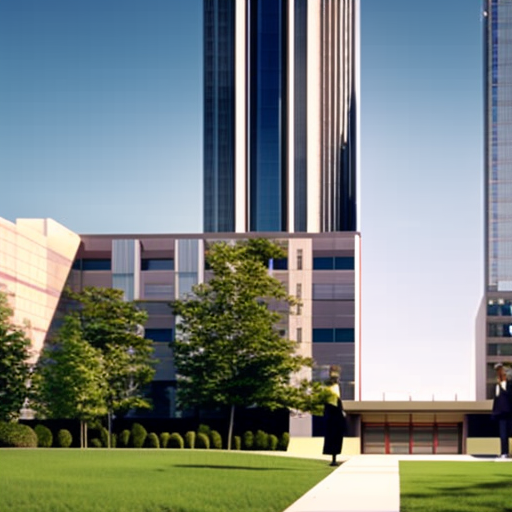Kresge partners receive $20M in federal funds to support energy efficient and resilient buildings – Kresge Foundation
Kresge partners receive $20M in federal funds to support energy ... The Kresge Foundation


The U.S. Department of Energy Announces Funding for Nonprofit Organizations to Implement Energy Efficiency Standards
The U.S. Department of Energy (DOE) has announced the cohort of nonprofit organizations selected to receive $90 million in funding from its Resilient and Efficient Codes Implementation (RECI) program. The RECI program was created to ensure buildings meet the latest standards for energy efficiency — reducing greenhouse gas emissions and lowering energy bills for American families and businesses.
Supporting the Sustainable Development Goals (SDGs)
The funding provided through the RECI program aligns with several Sustainable Development Goals (SDGs), including:
- SDG 7: Affordable and Clean Energy
- SDG 11: Sustainable Cities and Communities
- SDG 13: Climate Action
- SDG 17: Partnerships for the Goals
By investing in energy efficiency and reducing greenhouse gas emissions, these organizations contribute to the global efforts to combat climate change and promote sustainable development.
Funding Recipients and Projects
Established through the Bipartisan Infrastructure Law, RECI will support 27 projects across 26 states and the District of Columbia, according to the DOE press release. The funding will help states, cities, tribes, and partnering organizations implement updated energy codes for buildings.
Several Kresge grantees have received significant support over the course of five years. As a collective, the organizations below will be awarded roughly $20 million of the $90 million fund.
- American Council for an Energy-Efficient Economy (ACEEE) received $9.6M for the National Energy Codes Collaborative, a capacity-building network empowering states and cities to ensure new homes and buildings are built to be energy efficient. This effort also includes the Urban Sustainability Directors Network and several other organizations. Four initial state partners are the Colorado Energy Office; Louisiana State Energy Office; Michigan Department of Environment, Great Lakes, and Energy; and the New Jersey Board of Public Utilities Division of Clean Energy. The collaborative aims to expand to additional states.
- Institute for Market Transformation (IMT) received $5M for Community Climate Shift, which supports a cohort of jurisdictions through a community-led process to design and implement equitable building performance standards and supporting policies for existing buildings. Other partners in this effort include the People’s Climate Innovation Center, Building Electrification Institute, Greenlink Analytics, Elevate Energy, and Emerald Cities Collaborative, plus several others.
- Elevate Energy received $4.5M to develop a resource hub to provide a suite of services for building professionals, contractors, and building owners to support compliance with advanced energy codes and building policies such as decarbonization, benchmarking, and building performance standards in Illinois.
- Clean Energy Group received $1M to establish and advance a Climate Resilient Energy Code, a stretch code to improve resilience and health outcomes in affordable multifamily housing with a focus on disadvantaged communities.
Commitment to Equity and Climate Justice
“These organizations have a strong commitment to equity in the energy space,” said Jessica Boehland, senior program officer of Kresge’s Environment Program. “Achieving equitable climate action in U.S. cities requires a strong, well-resourced, and well-networked movement of trusted nonprofit organizations and leaders who center climate justice. One of our goals at Kresge is to facilitate an urban energy transition that eliminates carbon emissions while building power for low-wealth communities and communities of color and propelling racial and economic equity.”
Technical Assistance and Quotes from Partners
RECI awardees will provide technical assistance for updating state and local building codes, as well as for their successful implementation across the country. Below are several quotes from our partners:
- “States and cities across the country have an opportunity to reduce energy use, cut climate pollution and lower utility bills for families and businesses by tapping this expert assistance to improve building energy codes,” said Michael Waite, manager of ACEEE’s buildings program and project lead for the collaborative. “The National Energy Codes Collaborative will forge new connections across diverse communities and leverage a breadth of expertise to empower states to build up the capacity and workforce needed to reduce energy costs for families and businesses for generations to come.”
- “We are excited that the federal government is investing in more efficient, resilient, and healthy buildings. These funds will enable us to advance an innovative model for community-led policymaking strategies that will create jobs, reduce costs, and enable jurisdictions to better understand and support the priorities of residents,” said IMT’s Amy Boyce, director of technical strategy and federal engagement.
- “This award shows the federal government understands the importance of the work we are doing in Community Climate Shift to enable participatory policymaking. We have an amazing team of partners with both technical expertise and experience serving frontline communities. We look forward to collaborating on this important work,” added Jessica Miller, senior director of policy strategy and engagement at IMT.
Conclusion
The selected organizations have demonstrated the importance of ensuring climate change mitigation and adaptation policies and actions are developed and implemented with the knowledge, engagement, and leadership of residents who have been impacted most by the effects of climate change, Boehland added.
One core objective of Kresge’s clean energy strategy is supporting movement leaders, public-sector leaders, and technical partners as they work to define and advance an equitable and just urban energy transition. The Environment Program also works to help cities advance elements of the urban energy transition with particular importance to equity, including building decarbonization and renewable energy access.
Modernizing energy codes is one of the most cost-effective ways to improve energy efficiency in homes and businesses and make communities more resilient to extreme weather events, according to the DOE, both of which are key to addressing the climate crisis and achieving the Biden-Harris Administration’s ambitious clean energy goals.
Click here to learn more about the newest projects to support resilient and efficient building codes.
SDGs, Targets, and Indicators
1. Which SDGs are addressed or connected to the issues highlighted in the article?
- SDG 7: Affordable and Clean Energy
- SDG 11: Sustainable Cities and Communities
- SDG 13: Climate Action
- SDG 17: Partnerships for the Goals
The issues highlighted in the article relate to energy efficiency, reducing greenhouse gas emissions, and promoting climate resilience in buildings. These align with SDG 7, which aims to ensure access to affordable, reliable, sustainable, and modern energy for all. Additionally, the focus on updating energy codes for buildings and implementing equitable building performance standards connects to SDG 11, which focuses on making cities and human settlements inclusive, safe, resilient, and sustainable. The efforts to address climate change and achieve clean energy goals are relevant to SDG 13. Finally, the partnerships between nonprofit organizations, states, cities, tribes, and other stakeholders align with SDG 17, which emphasizes the importance of multi-stakeholder partnerships for achieving sustainable development.
2. What specific targets under those SDGs can be identified based on the article’s content?
- SDG 7.3: By 2030, double the global rate of improvement in energy efficiency
- SDG 11.6: By 2030, reduce the adverse per capita environmental impact of cities, including by paying special attention to air quality and municipal and other waste management
- SDG 13.2: Integrate climate change measures into national policies, strategies, and planning
- SDG 17.17: Encourage and promote effective public, public-private, and civil society partnerships, building on the experience and resourcing strategies of partnerships
Based on the article’s content, the specific targets identified include improving energy efficiency in buildings (SDG 7.3), reducing the environmental impact of cities through sustainable building practices (SDG 11.6), integrating climate change measures into policies and planning (SDG 13.2), and promoting effective partnerships for sustainable development (SDG 17.17).
3. Are there any indicators mentioned or implied in the article that can be used to measure progress towards the identified targets?
Yes, there are indicators mentioned or implied in the article that can be used to measure progress towards the identified targets. These include:
- Energy savings achieved through updated energy codes and building performance standards
- Reduction in greenhouse gas emissions from buildings
- Number of states and cities implementing updated energy codes
- Number of jurisdictions adopting equitable building performance standards
- Number of buildings complying with advanced energy codes and policies
- Number of affordable multifamily housing units improved through climate resilient energy codes
These indicators can be used to track progress towards improving energy efficiency, reducing environmental impact, integrating climate change measures, and promoting equitable and resilient buildings.
4. Table: SDGs, Targets, and Indicators
| SDGs | Targets | Indicators |
|---|---|---|
| SDG 7: Affordable and Clean Energy | 7.3: By 2030, double the global rate of improvement in energy efficiency | – Energy savings achieved through updated energy codes and building performance standards |
| SDG 11: Sustainable Cities and Communities | 11.6: By 2030, reduce the adverse per capita environmental impact of cities, including by paying special attention to air quality and municipal and other waste management | – Reduction in greenhouse gas emissions from buildings – Number of states and cities implementing updated energy codes – Number of jurisdictions adopting equitable building performance standards |
| SDG 13: Climate Action | 13.2: Integrate climate change measures into national policies, strategies, and planning | – Number of buildings complying with advanced energy codes and policies |
| SDG 17: Partnerships for the Goals | 17.17: Encourage and promote effective public, public-private, and civil society partnerships, building on the experience and resourcing strategies of partnerships | – Number of affordable multifamily housing units improved through climate resilient energy codes |
Behold! This splendid article springs forth from the wellspring of knowledge, shaped by a wondrous proprietary AI technology that delved into a vast ocean of data, illuminating the path towards the Sustainable Development Goals. Remember that all rights are reserved by SDG Investors LLC, empowering us to champion progress together.
Source: kresge.org

Join us, as fellow seekers of change, on a transformative journey at https://sdgtalks.ai/welcome, where you can become a member and actively contribute to shaping a brighter future.







